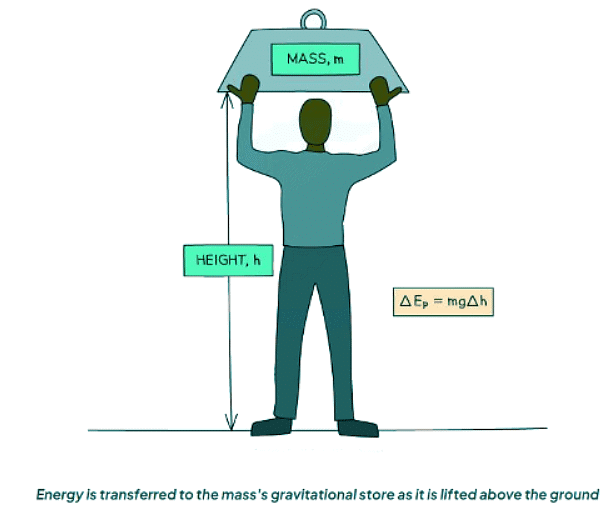Class 10 Exam > Class 10 Notes > Physics for GCSE/IGCSE > Gravitational Potential Energy
Gravitational Potential Energy | Physics for GCSE/IGCSE - Class 10 PDF Download
Gravitational Potential Energy
- Energy stored in the gravitational potential store of an object is the result of its height within a gravitational field.
- When an object is raised, energy is transferred to its gravitational store, while energy is transferred away from the store as the object falls.
- Gravitational potential energy can be computed using the equation: ΔEP = mgΔh.
- Here,
- ΔEP represents the change in gravitational potential energy, measured in joules (J),
- m denotes the object's mass, measured in kilograms (kg),
- g signifies the gravitational field strength, measured in newtons per kilogram (N/kg),
- Δh represents the change in height, measured in meters (m).

Solved Example
A man of mass 70 kg climbs a flight of stairs that is 3 m higher than the floor. Gravitational field strength is approximately 9.8 N/kg. Calculate the energy transferred to the man's gravitational potential energy store.
Ans: Step 1: List the known quantities
Mass of the man, m = 70 kg
Gravitational field strength, g = 9.8 N/kg
Height, Δh = 3 m
Step 2: Write down the equation for gravitational potential energy
ΔEP = mgΔh
Step 3: Calculate the gravitational potential energy
ΔEP = 70 × 9.8 × 3
ΔEP = 2058 J
The document Gravitational Potential Energy | Physics for GCSE/IGCSE - Class 10 is a part of the Class 10 Course Physics for GCSE/IGCSE.
All you need of Class 10 at this link: Class 10
|
126 videos|182 docs|35 tests
|
FAQs on Gravitational Potential Energy - Physics for GCSE/IGCSE - Class 10
| 1. What is gravitational potential energy? |  |
Ans. Gravitational potential energy is the energy an object possesses due to its position in a gravitational field. It is the energy stored in an object as a result of its vertical position or height above the ground.
| 2. How is gravitational potential energy calculated? |  |
Ans. Gravitational potential energy is calculated using the equation: GPE = mgh, where GPE is the gravitational potential energy, m is the mass of the object, g is the acceleration due to gravity, and h is the height of the object above the ground.
| 3. Why is it important to understand gravitational potential energy? |  |
Ans. Understanding gravitational potential energy is important as it helps in explaining various phenomena in physics, such as the motion of objects in a gravitational field, the concept of work done against gravity, and the conservation of energy in a system.
| 4. How does gravitational potential energy relate to kinetic energy? |  |
Ans. Gravitational potential energy can be transformed into kinetic energy and vice versa. As an object falls, its gravitational potential energy decreases while its kinetic energy increases. This relationship is described by the law of conservation of energy.
| 5. Can gravitational potential energy be negative? |  |
Ans. Gravitational potential energy can be negative if an object is positioned below a reference point, such as the ground level. In such cases, the gravitational potential energy is considered to be negative relative to the reference point.
Related Searches















